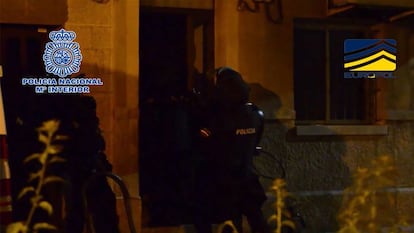Six held in joint counter-terrorism raid in Spain, Britain and Germany
Four suspects arrested in Palma de Mallorca over ties to ISIS; UK-based imam was their spiritual leader
Intelligence agencies in Spain, Britain and Germany have launched a joint operation against jihadist terrorism in all three countries. The raid, which began on Tuesday afternoon, has so far resulted in at least six arrests: four in Spain, one in Britain and another in Germany, police and judicial sources have told EL PAÍS.

The operation is being led by Spain’s High Court, the Audiencia Nacional, which has ordered several searches in three European cities.
Sources familiar with the investigation said that a number of the detainees have ties to one another, and that they are allegedly involved in recruitment and propaganda work for the so-called Islamic State group (ISIS). They are also believed to have been sending combatants to conflict zones in Syria and Iraq.
Counter-terrorism sources said that more than 1,000 individuals are on their radar
The suspects are alleged to have been in possession of video material containing inflammatory messages by ISIS leaders and showing acts of violence.
Sources at the Spanish Interior Ministry said that a cell based in Palma de Mallorca was meeting on a weekly basis to determine the willingness of youths sympathetic to their cause to travel to combat zones. This group had progressively increased the number of individuals under its influence.
The investigation began in 2015, when authorities found a website with videos that illustrated the process of recruiting a young Muslim man living in Spain, indoctrinating him and sending him to Syria.
The person behind the video footage was found to be a Salafist imam who has been arrested in Britain and who is under investigation by several European countries. This individual had traveled to Palma de Mallorca and was priming a group – whose members have now been arrested as well – for recruitment, indoctrination and radicalization activities. He was also their spiritual leader.
This Salafist preacher, whose public rhetoric was well known to European police and intelligence services, was privately devoted to the task of securing combatants and funds for the fight in Syria. His personal security measures, which included constant residency changes, had made his arrest particularly difficult.
A UK-man based man is believed to be the spiritual leader of several of the suspects arrested
The suspect held in Germany also looked to the UK-based preacher as his spiritual and ideological reference point. He was in direct contact with the other detainees, and had participated in the propaganda videos made by the group.
The coordination work involved in this international raid forced judges, prosecutors and information service officials to remain at their posts for 24 hours. Very little information about the raid trickled out in an effort to ensure that the suspects would be found. Their identities and nationalities have not been released, as the operation is still underway.
Collaborating agencies include Spain’s National Intelligence Center, the German Federal Police, the London Metropolitan Police and Europol, among others.
Two years ago, Spain set the threat of a terrorist attack on Spanish soil at Level 4 (with 5 being the maximum). Since then, 172 alleged jihadists have been arrested. Three of these were held in Madrid on June 21, although two were subsequently released.
Since the Islamist attacks on Madrid commuter trains on March 11, 2004, there have been more than 700 arrests in Spain. More than a hundred of those detained have completed prison terms and have been subsequently expelled from the country for a period of 10 years. There is no evidence that any of them have returned.
Counter-terrorism sources said that there are over 1,000 individuals on their radar, that 259 people are under formal court investigation, and that 500 telephones are being tapped.
A silent “army” of more than 3,000 law enforcement officers, spies, prosecutors, judges and analysts are working in the shadows to stop jihadists from striking again in Spain, where 192 people died and over 2,000 were injured in the 2004 Madrid train bombings.
English version by Susana Urra.
Tu suscripción se está usando en otro dispositivo
¿Quieres añadir otro usuario a tu suscripción?
Si continúas leyendo en este dispositivo, no se podrá leer en el otro.
FlechaTu suscripción se está usando en otro dispositivo y solo puedes acceder a EL PAÍS desde un dispositivo a la vez.
Si quieres compartir tu cuenta, cambia tu suscripción a la modalidad Premium, así podrás añadir otro usuario. Cada uno accederá con su propia cuenta de email, lo que os permitirá personalizar vuestra experiencia en EL PAÍS.
¿Tienes una suscripción de empresa? Accede aquí para contratar más cuentas.
En el caso de no saber quién está usando tu cuenta, te recomendamos cambiar tu contraseña aquí.
Si decides continuar compartiendo tu cuenta, este mensaje se mostrará en tu dispositivo y en el de la otra persona que está usando tu cuenta de forma indefinida, afectando a tu experiencia de lectura. Puedes consultar aquí los términos y condiciones de la suscripción digital.








































